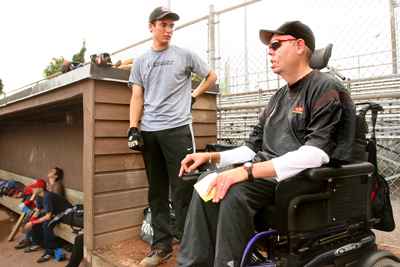Carey Ashton: Life lessons from the diamond
Carey Ashton: Life lessons from the diamond McGill University
User Tools (skip):
PROFILE
Carey Ashton: Life lessons from the diamond

Carey Ashton, right, shares some of his baseball insight with pitcher Aaron
OWEN EGAN
A. Bartlett Giamatti, the former president of Yale University and the seventh commissioner of Major League Baseball, once wrote this about the game he so dearly loved; "It breaks your heart. It is designed to break your heart. The game begins in spring, when everything else begins again, and it blossoms in the summer, filling the afternoons and evenings, and then as soon as the chill rains come, it stops and leaves you to face the fall alone."
Carey Ashton, the bench coach of the McGill Redbirds baseball team, might disagree. For most of his life, beginning as a young boy rounding third and charging home on fleet feet, to today, confined to a wheelchair and only able to move his hands as a result of his lifelong struggle with muscular dystrophy, Ashton has never felt abandoned by the game. If anything, baseball has been Ashton's companion, helping the 47-year-old survive decades longer than most people with MD. "I stay alive for my family," he says "but baseball has always been my motivation to try to get to the next day."
This is particularly true in the wintry off-season months—a dangerous time for people with MD as their weakened respiratory systems are so susceptible to infection that even a common cold can take a life-threatening turn. "When I'm not feeling well or have a medical problem, I think about the kids and what I can do to help them become better players," says Ashton. "I focus on the season ahead and it helps me get through the hard times."
Extended baseball family
Ashton has two sets of baseball "kids" to help him through the tough patches. First, there is his NDG Lynx Little League team. Before he began coaching the Lynx seven years ago, no NDG team had ever made it to the national championships. Under Ashton's guidance, the Lynx have now competed in three of the last four nationals—not bad for a guy who can't throw batting practice or demonstrate how to lay down a bunt. "My real strength as a coach is my ability to communicate," he says. "That and my desire."
Immediately after the Lynx season ended in August, Ashton began helping Redbird's head coach Ernie D'Alessandro prepare for McGill's upcoming campaign. This year will be somewhat different than previous ones as the Redbirds are defending national champions following the team's remarkable late-season run all the way to the title in 2006—the only McGill team to win a Canadian championship last year. "The biggest difference I've seen this year is that we had a lot more guys trying out for the team," laughs Ashton. "You win a championship and guys start coming out of the woodwork."
The McGill season can be particularly hard on Ashton, as the weather can wreak havoc on his health. Last year's national championship tournament is a perfect example. Held in late October in Nepean, Ont., the tournament was marred by freezing weather and driving rain that "came in sideways," says Ashton. It snowed during the final, an 8-0 Redbird win over Dalhousie, turning the field into a muddy morass. As always, Ashton soldiered on. "I'm not a quitter. I don't have to say anything to the guys, they understand," says Ashton, quiet pride in his voice. "They see someone who is willing to go out there—not just stay at home—and I think it makes a difference."
While it makes sense that Ashton, the man whose body is failing, excels in what he calls "a thinking man's game," his sporting passion is divided. "I'm a huge fan of McGill football," he says. So much of a fan that his 26-year streak of never missing a Redmen home game was only broken when he joined the Redbirds six years ago. So much so, that following the football Redmen's national championship in 1987—a game he watched on T.V. while battling pneumonia—Ashton had the football team's emblem tattooed over his heart.
Still, baseball is Ashton's lifeblood. "I truly adore the guys on both teams I coach and I honestly live to be around them," he says. And, with six appearances at the nationals in a short seven-year coaching career, clearly Ashton is more than just the "guy in the wheelchair." He is a remarkable coach.
"I never thought I would do anything in sports even though I adored them so much. Now I go to tournaments across Canada and umpires, coaches and players know who I am because of what I've done. That's pretty cool for someone growing up knowing that they might not live long."
Search
Search (skip):
"I stay alive for my family but baseball has always been my motivation to try to get to the next day."Carey Ashton

